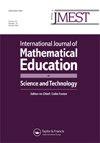数学是工程学的障碍吗?
IF 0.6
Q3 EDUCATION & EDUCATIONAL RESEARCH
International Journal of Mathematical Education in Science and Technology
Pub Date : 2023-10-11
DOI:10.1080/0020739x.2023.2256319
引用次数: 0
摘要
数学传统上被认为是工程学课程的必修课。在过去的三十年里,澳大利亚工程专业对数学的要求稳步下降。此外,工程课程的数学部分逐渐减少。本研究旨在探讨以下两个问题。首先,数学是学生完成工程课程的障碍吗?第二,数学的表现和工程的表现有联系吗?我们确定了与加权平均分和工程研究在本科水平和硕士水平的完成状态相关的重要因素。特别令人感兴趣的是学生们的数学背景。此外,对西澳大利亚大学工程专业的学生进行了一项调查,以更深入地了解学生对数学如何影响他们的工程学习的态度和看法。对调查数据进行了二元logistic模型拟合。此外,还进行了焦点小组访谈,以了解学生对工程数学教学有效性的看法。讨论了数学和统计学在工程课程中的重要性。本文章由计算机程序翻译,如有差异,请以英文原文为准。
Is mathematics a barrier for engineering?
Mathematics is traditionally considered necessary for engineering courses. Over the last three decades, the mathematics requirements for entry into engineering programmes has steadily weakened in Australia. Further, the mathematics component of engineering programmes has progressively decreased. This research aims to investigate the following two questions. First, is mathematics a barrier for students to complete an engineering programme? And second, is performance in mathematics associated with performance in engineering? We identified the significant factors associated with weighted average mark and the completion status of engineering studies at both an undergraduate level and a Masters level. Of particular interest was the students' mathematical background. Furthermore, a survey of students enrolled in engineering at the University of Western Australia was conducted to obtain more in depth views of student attitudes and perceptions towards how mathematics has affected their engineering studies. Binary logistic models were fitted to the survey data. Additionally, focus group interviews were conducted to gain insight on student perspectives regarding the effectiveness of mathematics teaching in engineering. The results are discussed in relation to the importance of mathematics and statistics for the engineering curriculum.
求助全文
通过发布文献求助,成功后即可免费获取论文全文。
去求助
来源期刊

International Journal of Mathematical Education in Science and Technology
EDUCATION & EDUCATIONAL RESEARCH-
CiteScore
3.30
自引率
11.10%
发文量
123
期刊介绍:
Mathematics is pervading every study and technique in our modern world, bringing ever more sharply into focus the responsibilities laid upon those whose task it is to teach it. Most prominent among these is the difficulty of presenting an interdisciplinary approach so that one professional group may benefit from the experience of others. The International Journal of Mathematical Education in Science and Technology provides a medium by which a wide range of experience in mathematical education can be presented, assimilated and eventually adapted to everyday needs in schools, colleges, polytechnics, universities, industry and commerce. Contributions will be welcomed from lecturers, teachers and users of mathematics at all levels on the contents of syllabuses and methods of presentation.
 求助内容:
求助内容: 应助结果提醒方式:
应助结果提醒方式:


